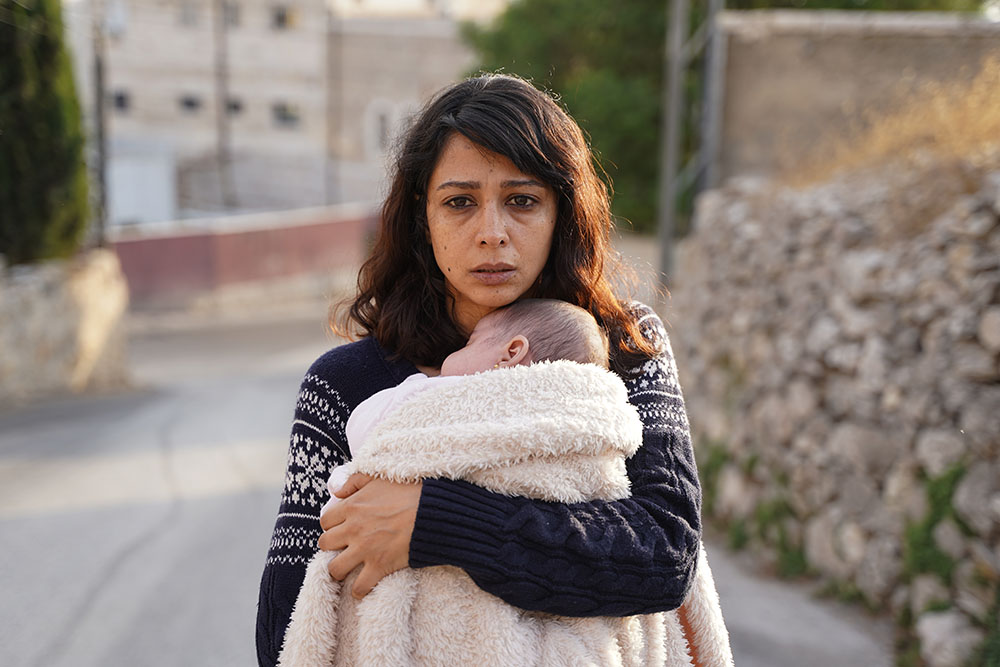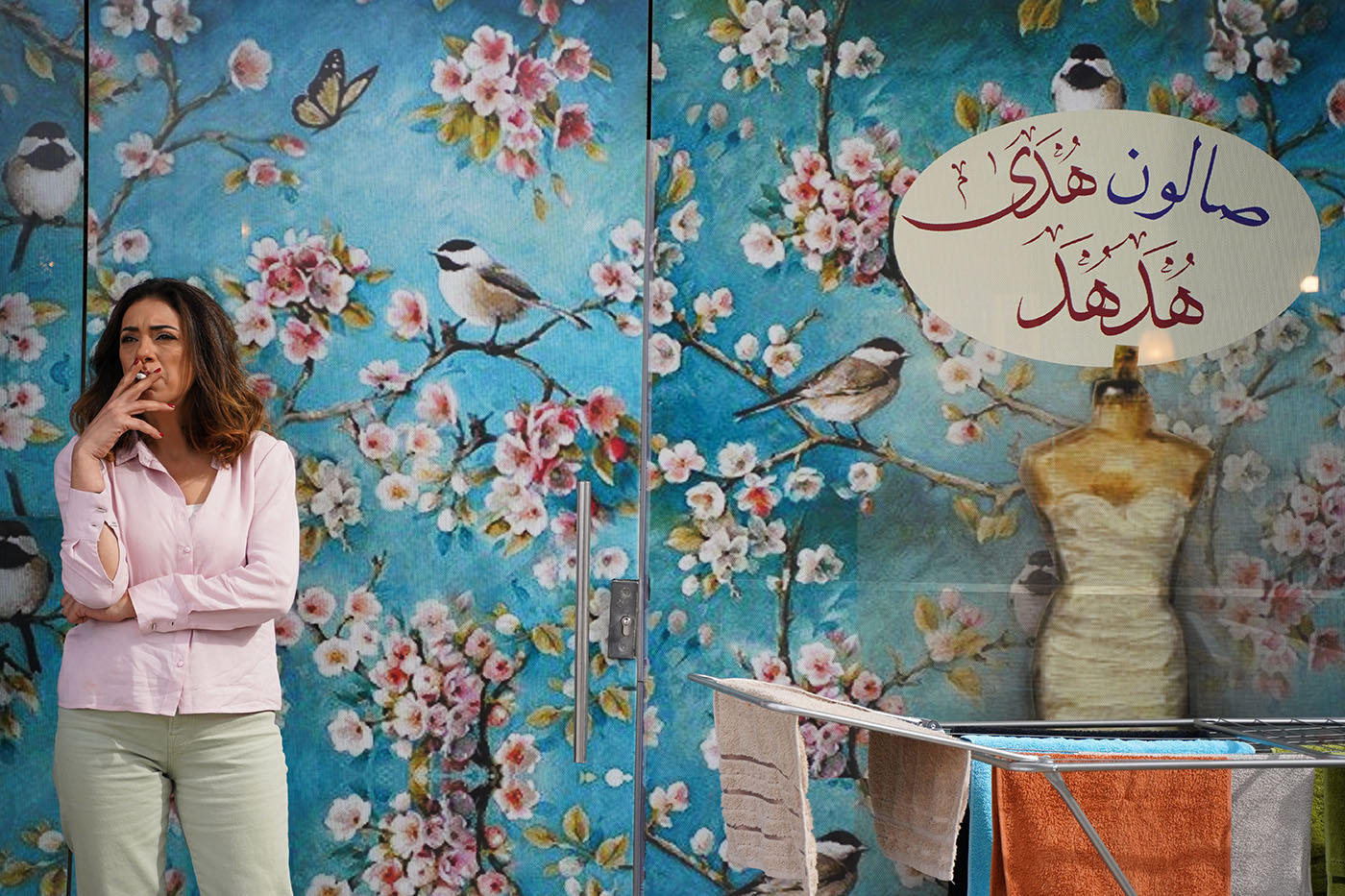Huda’s Salon is available in select U.S. and European theatres and everywhere you rent movies. In the U.S. visit this site for tickets.
Jordan Elgrably

Palestine. Israel.
It’s not just a matter of living under apartheid — it’s living with treachery, not knowing who you can trust.
For a couple in Bethlehem, their lives are not only defined by apartheid, but by the daily threat of being shot at by trigger-happy settlers, police or soldiers, who rarely pay a price for murder. And everyone is subject to being spied upon, or being turned.
To be clear, Bethlehem is in Palestine, not Israel, but Israel has carved up the occupied West Bank into three areas of control; Bethlehem, which is about 10 kilometers south of Jerusalem/Al Quds, is in the so-called “Area A” zone administered by the Palestinian Authority.
While Israel denies the validity of the February 1, 2022 Amnesty International report on how its apartheid system controls Palestinians, it nonetheless exercises control over all Palestinians inside Israel and the West Bank, while keeping Gaza locked down in a siege that is now nearly 15 years old.
In his latest feature, Huda’s Salon, Hany Abu-Assad returns to his central subject, Palestine, or the fragments of it. The movie begins with a chatty conversation between Huda (Manal Awad), a hairdresser, and Reem (Maisa Abd Elhadi), a young woman getting her hair done, while her infant dozes nearby. The story quickly takes a dark turn, and one immediately wonders how much of what follows is reality, and how much is fiction?
Abu-Assad, who wrote the script, confesses, “The story is based on real events. It did happen in Palestine that secret service officers used certain hair salons to drug women, then put them in an awkward position and take Polaroids, so that they could blackmail them into becoming traitors against Palestine. And they used vulnerable women in Arab society, women who wouldn’t get support from their husbands or families…The film is based on a real story, but I want to be clear that these characters are still fictional.”
Abu-Assad previously visited similar themes of loyalty and betrayal in Omar (2013), in which a young would-be Palestinian revolutionary gets turned by a Shin-Bet agent. Forced to betray his political convictions, the question posed to Omar and the viewer is: how much are you willing to sacrifice, to survive?
In Huda’s Salon, everything is happening beneath the surface. As Ali Suleiman’s “resistance” character Hassan insists, “Traitors in our society are like a cancer in the body.” The viewer questions the health of Bethlehem society, which is under constant assault and control by the Shin-Bet, as well as by the Palestinian authorities, the “resistance,” and of course the settlers and Israeli army.
Huda is meant to be a tragic figure, yet she seems one of the few Palestinians in the story with agency. She lost custody of her children in a nasty divorce, which is her tragedy, but she fights back against patriarchal society by cooperating with the mukhabarat — the secret police here are Israeli occupation agents, often passing for Arabs, or speaking Arabic fluently, but they are in any case in the background; they are in fact, invisible, like evil djinns.
The word “Israel” is never mentioned.
Reem at first blush seems like an innocent housewife, going to the salon for a new hairdo. She talks to Huda about her doubting husband Yussef, who is jealous and doesn’t trust her, though she insists she has no lover and nothing to hide.
Trust is the one thing everyone needs and no one seems to have in this story.
Huda’s Salon feels very much like a huis clos — even when Reem is hurrying down a Bethlehem street, her world seems small, hemmed in. It is as if no one has much air to breathe; the viewer feels as if s/he is in confinement, watching these characters struggle to exist — forget about coexistence, for there is no sharing Palestine/Israel.
The dream of the two-state solution is dead; there is just one state, one Big Brother, under which Israeli Jews enjoy all the freedoms of a liberal democracy, while Palestinians in the occupied West Bank, carved into Areas A, B and C, live like lab rats, scurrying about, knowing they serve as Israel’s test animals — Israeli military and high tech probes the latest weapons and crowd-control gadgets on Palestinians, before marketing their products to the world — indeed, as one observer has written, “Israel tries out weapons in the West Bank and Gaza and then presents them as ‘battle proven’ to the international market.”
Reem is further hemmed in; her brother-in-law is in jail (we do not know why, nor does it matter), she is therefore banned from travel. She would have to obtain a permit from the occupation authorities, who are the very people Huda would have her spy for.
How do you change your life once you work with the mukhabarat, once you spy? The only benefit, Huda observes, is that the women become empowered around their husbands. Hassan, the resistance leader asks incredulously: “By collaborating with the enemy, the occupation?”
“Which enemy? Everyone is an enemy.”
Huda adds: “It’s easier to occupy a society that is already repressing itself.”
To my mind, everyone in Huda’s Salon is a tragic figure, because everyone struggles to survive, to have agency in a world where you exercise very little control over your own destiny. The occupation authorities control birth and death records, taxes, access to water and power, and travel. They are the overlords, while the Palestinians are a people who eke out an existence by sheer sumud — an admirable steadfastness that does not leave enough room for a carefree existence, much less lasting happiness.
If Huda’s Salon serves any purpose, it is to underscore the need for an end to Israel’s apartheid system over Palestinians, and for Israel/Palestine to become one state, shared equally with equal rights for all its citizens, from the Jordan River to the Mediterranean.




